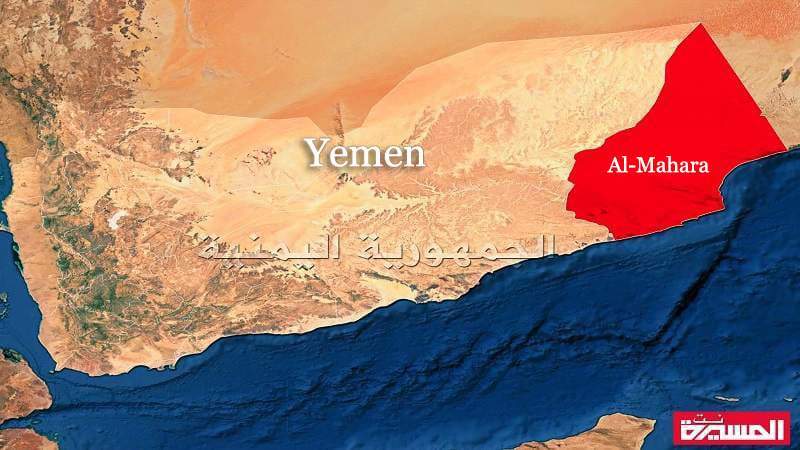Mahra Tribes Demand Withdrawal of Occupation Forces from Al-Ghaydah Airport

News - Yemen: Al-Mahra tribes have renewed their demand for the withdrawal of foreign forces from Al-Ghaydah airport, which they have used as a military base since the start of the US-Saudi-Emirati aggression on Yemen eight years ago.
Salem Al-Zuwaidi, head of Sihut and Al-Masila sit-in committee, explained that the Saudi occupation of Al-Ghaidha airport caused great suffering to the people of Wadi Al-Masila and delayed food relief, which was transported before by helicopters.
He stressed the need for the occupation forces to leave Al-Ghaydah airport and restore work to it as a civilian airport that serves all the people of Al-Mahrah.
Saudi Arabia's consolidation of its presence in Al-Mahra, which has turned into a theater to perpetuate the occupation of Riyadh and impose its influence, has a series of economic and strategic ambitions behind .
In 2021, a report by Quentin Muller stated that Mahra and Socotra have witnessed different interventions from the Kingdom of Saudi Arabia and the United Arab Emirates.
Mahra, on the border with Oman, hundreds of kilometers from the northern front, is not affected by shelling or clashes on the ground, but Saudi Arabia has deployed a huge arsenal in Mahra since 2017, which it claims is its official goal to combat arms smuggling that may take place across the border with Oman. The Saudis say they suspect Oman of leniency with Iran.
At the end of 2017, Riyadh seized the port of Nishtun, the Shaheen and Sarfeet border posts, and the Ghayda Airport.
“The Saudi strategy is to seize control of key transportation sites to prevent deliveries to Houthi or, potentially, pro-Omani forces in the region,” says Ryan Pohl, a Middle East analyst at the think tank Stratfor.
Al-Ghaydah Airport, which was one of the last airports to provide civil flights, was monopolized by the Saudi military forces, who made it one of their military bases in Al-Mahra.
In 2017, Mohammad Abdullah Kedah, the Mahri governor who holds an Omani passport, was fired and replaced by Rajeh Saeed Bakrit, who was chosen by the Kingdom of Saudi Arabia while carrying its passport.
Elizabeth Kendall, a researcher in Arab and Islamic studies at Pembroke College at Oxford University, says Riyadh’s power game is unpalatable in Mahra: “The Saudi intervention provokes strong hostility, especially along the densely populated coast.”
Mahra residents assert that the Saudis raised taxes at the border, and many tribal leaders say they received Saudi offers to gain influence in exchange for money and arms. This is an insult to many of them with whom Oman has ties based on security and humanitarian exchanges, which are well-established and much older.
“There are violations [of the law] by the leaders of the Saudi forces. There is no respect for the local authority which is under constant surveillance,” the former governor of Mahra, Mohammad bin Kuddah confirmed.
With a harsh face and a grim look, the former head of the border guards does not hide his anger. “Saudi Arabia came to Mahra to colonize our region. The Saudis want to rule and steal this land and build a pipeline to the Arabian Sea. They consider Mahra perhaps one of the provinces of their kingdom. But our people will not allow that to happen.”
Recently, the US deployed groups of its forces in Hadramawt and Al-Mahra. It has turned the civilian airports Al-Rayyan and Al-Ghaydah into military barracks used as headquarters for American and British soldiers and as military and intelligence centers targeting Yemen and the region, including through the training of spies
This activity is not a precedent, but an American behavior that was exposed wider in Yemen.
For decades, the regional and international race for positioning in the region, including the African Bank and along the coast, has been the most prominent face of the scramble of forces. However, the ongoing political and military transformation in Yemen makes the US influence in the region a matter of time.
The accelerated US activities in Hadramout and Al-Mahra looks militarily sometimes and politically many times. It is also linked to the failure to reach an acceptable formula that guarantees the continuation of the flow of oil to the US-Saudi tools.
#Yemen #Mahara #US-Saudi Aggression About 1 year-
07:13
Mujahideen Movement: Who should be listed as terrorists are Netanyahu, his army, and his criminal government, charged by the ICC
07:12
Mujahideen Movement: The US decision is a badge of honor for Ansarullah, proof that they are on the right path
07:10
Mujahideen Movement: Yemeni support for Gaza is a noble act to stop genocide against a besieged people, something the world has failed to do
06:53
Palestinian Mujahideen Movement: We condemn the US labeling Ansarullah as terrorists for supporting Palestine
07:37
Al-Rowaishan: We affirm that Yemen faced attempts and pressures, but it only responded when the aggression against Gaza stopped.





